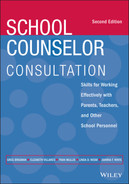Foreword
This text on school counselor consultation is as timely as it is helpful. The publication of the second edition comes on the heels of the global COVID-19 pandemic and other discontent tied to myriad forms of societal inequity and injustice. Current circumstances exasperate long-standing inadequacies in our various social institutions and further illustrate how essential schools can be for a great number of people. While schools are intended to be a hub for learning and social advancement, often school environments can further perpetuate the types of personal and social ineffectuality that limit individual and collective growth. Consultation services offered by school counselors cannot possibly exceed the total threats to students, schools, or entire social systems, but this approach to school counseling can offer tangible practice behaviors that can support the individual student and total school alike.
As consultant, a school counselor generally provides an indirect service to one or more third party individuals (consultees) who will later put into use the content of the consultation session(s). It is assumed that the consultee will develop some type of appreciable skill, which will in turn be embodied by the consultee in a manner that will positively affect a student or group of students. This way of professional practice is more systemic and ecological in nature. The school counselor as consultant has amplified one’s reach, as the consultee will certainly interact with a great variety of students over long periods of time.
The brand of school counseling consultation proffered in this text is consistent with the best practices across a variety of disciplines. In this book, Brigman and colleagues suggest that school counselor adopt a “tell, show, do, coach” approach. To tell is not simply didactic advice giving. Instead, a consultant inspired by this approach considers the presenting topic, the unique needs and qualities associated with the consultee, and the cultural character of the situation. Once these constituent ingredients are thoroughly considered, the school counselor consultant articulates (“tells”) the qualities associated with the circumstance. To tell in consultation also includes exposure to the necessary prior knowledge for success. Stated plainly, rather than the school counselor telling the consultee what to do (based on the school counselor’s perspective), the school counselor draws from a larger ecology of wisdom and helps express it in an actionable manner.
The steps of showing and doing in consultation are also consistent with this systems- focused approach to school counseling practice. Showing is not simply some top-down “let me show you how it is done” overture, rather, the intent is to both model possible alternatives and instill a sense of flexibility across varying possibilities. Too often, events that transpire in a school feel habitual or disempowering; through showing, the school counselor as consultant exposes how happenings in school are both personally relevant and yet unsentimental. In kind, what is exposed as one of many possibilities in the showing portion invites the consultee to try on each of the various possibilities in the doing activities. The distancing necessary to break old rigid beliefs and behaviors now returns to the consultee in the doing phase in a way that is relevant to what one can do in a school and the qualities of the school environment.
Finally, the coaching portion of this consultation practice is as pivotal as the other ingredients. An effective coach encourages the consultee to implement and adjust using one’s wherewithal as necessary. A coach has helped the individual prepare in advance, but continues to support and strategize, with the consultee as the predictable and unpredictable manifest in a school.
In addition to the “tell, show, do, coach” motif used throughout the text are the incredibly helpful skills checklists, experiential activities, and examples through cases or workshops. In this way, the text itself mirrors the philosophical position of “tell, show, do, coach”—that is, readers are presented with the important prior knowledge about consultation practices, they are shown examples and encouraged to try out hypothetical examples, and throughout the text, they are offered ongoing encouragement to be best consultants possible!
This textual consistency is augmented by six new chapters compared to the original edition of this book. These six chapters provide deeper explication of the philosophic underpinnings of this type of consultation and offer other specific case examples customary to contemporary school counseling.
This second edition of this consultation text fits within a larger suite of school counseling practices promulgated by Brigman and his many collaborators (e.g., Student Success Skills, Ready to Learn). These other approaches tend to focus first on how a school counselor can intervene with a particular student such that they can actualize the student’s potential. While the student focus is clear, in these works it is also evident that school counselors must expose the content to the various adults in the lives of students. This book on school counselor consultation inverts this focus while maintaining continuity in the belief that any student change must be complimented with changes at the school system level. The importance of this philosophic and practice position cannot be undersold. Schools are complex networks of individuals, and they only thrive when as many individuals are empowered to support and share in their collective successes.
Matthew Lemberger-Truelove
Professor, University of North Texas
Editor, Journal of Counseling & Development
Author, Theories of School Counseling for the 21st Century
